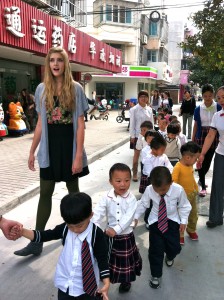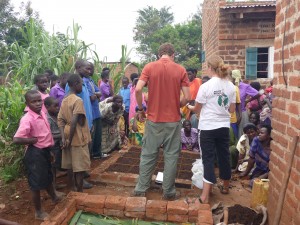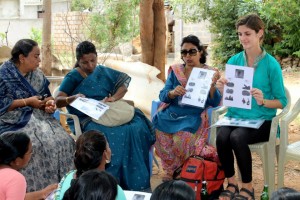
Voluntourism is trending throughout Western societies, but many criticize its impact and the motives behind the experience.
It’s not only a way to travel the world, but it also enables travelers to feel like they make a difference in the lives of those less fortunate. But there is speculation over who this type of volunteer work impacts the most.
In a BYU Radio interview with Marcus Smith, BYU professors Steve and Julie Hite talked about the issues involved with voluntoursim and how the students usually end up the most affected by these programs.
“In the development community, the programs that take individuals over … is called a ‘pet-a-native’ program,” Steve Hite said. “It’s quite derogatory, but it’s fairly accurate, and that is that a lot of good-hearted, well-intentioned folks go over to change their (the volunteers’) lives … without sufficient focus on how can we help facilitate changing lives of those whom we serve.”
Steve Hite explained that a typical American approach to a problem is through money, creating a “cycle of dependance” and fostering expectations from these handout donations.
“It’s not done in a cooperative sense but rather the belief … that money solves all evils,” he said.
The Hites founded TRUE Africa, a nonprofit organization dedicated to educating children with AIDS in Uganda. According to the organization’s website, the goal of TRUE Africa is to “empower African children by enhancing their educational conditions and opportunities.”
Steve Hite acknowledged that even they made mistakes when first starting TRUE Africa. He said they learned while working in cooperation with locals and organizations that would eventually bring business and sustainability to their community.
Examples exist of other volunteers who misassess opportunities based on their cultural approaches. Jonathan Hunt, a 21-year-old accounting major from Amarrillo, Texas, said he had many experiences serving in which he felt being unskilled did more harm than good. While in Sao Jose, Brazil, he knew an old man named Leonardo, whom he tried to serve but did not have the skill set to do so.

“One day we saw him working on his roof; he was trimming branches from a tree over his house, but he was about 85 years old, so we decided to go help him out,” Hunt recounted. “I climbed up the ladder and started to step on the roof when he (Leonardo) yelled something at me that I couldn’t hear. Next thing I knew I had fallen right through the roof and broken half the beams and shingles. I knew nothing about fixing roofs and had just done more damage than good.”
Although going into a foreign country with no skills to offer locals can be a bad idea, some organizations focus on the skills volunteers already have, such as English proficiency. ILP is one such organization.
ILP, which stands for International Language Programs, allows volunteers to teach English to children in a foreign country while experiencing the culture and traveling.
“We already know how to speak English, so we are giving them something we know really well,” said Brianna Pesci, the ILP representative supervisor.
Pesci volunteered in China for five months and said she gained a lot from her experience but also taught the children a valuable skill that will help them get farther in life.
Rachel Wade, a 22-year-old senior from St. George studying recreation management, was a program director for another organization that focuses on empowerment and sustainability. HELP International tries to avoid association with “voluntourism,” focusing on the effectiveness of their programs rather than the tourism side of the trips.
“…Their model is all about sustainable development work, so it’s empowering people to fight global poverty for themselves,” Wade said. “What the program does is instead of giving people a handout, it’s more like giving them a hand up.”
HELP international is a company trying to distance themselves
Having also volunteered in Nicaragua, Wade said she has seen various organizations that could not accurately asses the needs of the communities and thus provided little or no benefit to them. One of the responsibilities of a HELP International program director is to conduct needs assessments and create projects based off those needs. Wade noted that many volunteers come with a project in mind that they want to do, but it may not fit the needs of the community.
“With each community there was always different things; there was always a need for something,” Wade said.

Wade remarked that the experience of volunteering this way has an impact on the volunteer just as much, if not more, than on the community. She said a challenge they faced was unskilled volunteers who could not offer these small communities the knowledge they needed.
“They were passionate, they were happy to be there, but they didn’t have anything they could teach the people that the people didn’t already know,” Wade said.
In these cases it becomes less effective and more difficult for volunteers if they don’t go with something specific in mind to teach people. Wade said sometime students will teach themselves material, but it doesn’t always work out that way.
Alternatively, BYU offers programs for students looking for service and learning. Most common are the Kennedy Center’s International Study Programs. Lynn Elliot, the director and program coordinator for the International Study Programs, said BYU students looking to further their degrees and education should consider a study abroad, whereas those looking for the international experience should consider a volunteer program.
However, Elliot said these programs tend to have more effect on the students’ lives and little lasting effect on the communities. This is something students should keep in mind when considering volunteering.




